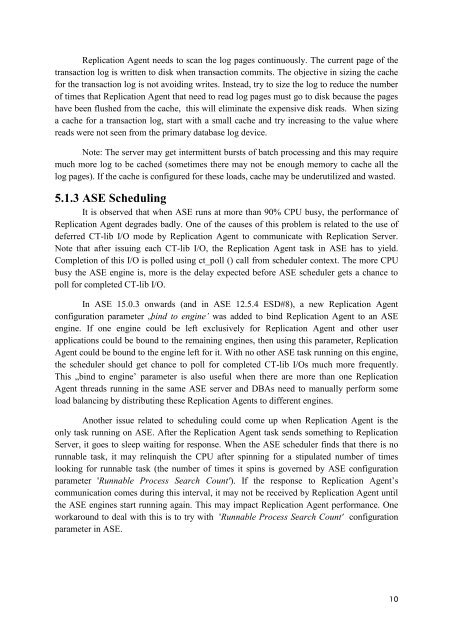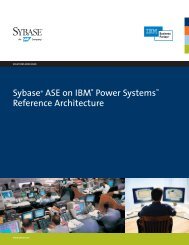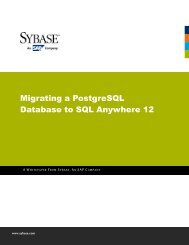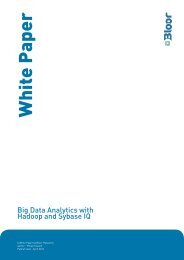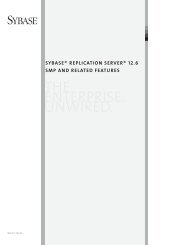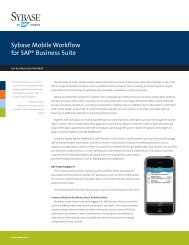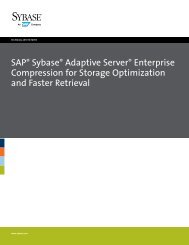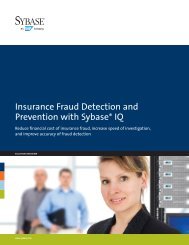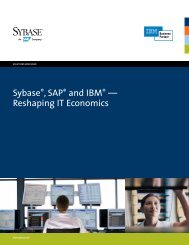Replication Server 15.5 Performance and Tuning Tips - Sybase
Replication Server 15.5 Performance and Tuning Tips - Sybase
Replication Server 15.5 Performance and Tuning Tips - Sybase
You also want an ePaper? Increase the reach of your titles
YUMPU automatically turns print PDFs into web optimized ePapers that Google loves.
<strong>Replication</strong> Agent needs to scan the log pages continuously. The current page of the<br />
transaction log is written to disk when transaction commits. The objective in sizing the cache<br />
for the transaction log is not avoiding writes. Instead, try to size the log to reduce the number<br />
of times that <strong>Replication</strong> Agent that need to read log pages must go to disk because the pages<br />
have been flushed from the cache, this will eliminate the expensive disk reads. When sizing<br />
a cache for a transaction log, start with a small cache <strong>and</strong> try increasing to the value where<br />
reads were not seen from the primary database log device.<br />
Note: The server may get intermittent bursts of batch processing <strong>and</strong> this may require<br />
much more log to be cached (sometimes there may not be enough memory to cache all the<br />
log pages). If the cache is configured for these loads, cache may be underutilized <strong>and</strong> wasted.<br />
5.1.3 ASE Scheduling<br />
It is observed that when ASE runs at more than 90% CPU busy, the performance of<br />
<strong>Replication</strong> Agent degrades badly. One of the causes of this problem is related to the use of<br />
deferred CT-lib I/O mode by <strong>Replication</strong> Agent to communicate with <strong>Replication</strong> <strong>Server</strong>.<br />
Note that after issuing each CT-lib I/O, the <strong>Replication</strong> Agent task in ASE has to yield.<br />
Completion of this I/O is polled using ct_poll () call from scheduler context. The more CPU<br />
busy the ASE engine is, more is the delay expected before ASE scheduler gets a chance to<br />
poll for completed CT-lib I/O.<br />
In ASE 15.0.3 onwards (<strong>and</strong> in ASE 12.5.4 ESD#8), a new <strong>Replication</strong> Agent<br />
configuration parameter „bind to engine‟ was added to bind <strong>Replication</strong> Agent to an ASE<br />
engine. If one engine could be left exclusively for <strong>Replication</strong> Agent <strong>and</strong> other user<br />
applications could be bound to the remaining engines, then using this parameter, <strong>Replication</strong><br />
Agent could be bound to the engine left for it. With no other ASE task running on this engine,<br />
the scheduler should get chance to poll for completed CT-lib I/Os much more frequently.<br />
This „bind to engine‟ parameter is also useful when there are more than one <strong>Replication</strong><br />
Agent threads running in the same ASE server <strong>and</strong> DBAs need to manually perform some<br />
load balancing by distributing these <strong>Replication</strong> Agents to different engines.<br />
Another issue related to scheduling could come up when <strong>Replication</strong> Agent is the<br />
only task running on ASE. After the <strong>Replication</strong> Agent task sends something to <strong>Replication</strong><br />
<strong>Server</strong>, it goes to sleep waiting for response. When the ASE scheduler finds that there is no<br />
runnable task, it may relinquish the CPU after spinning for a stipulated number of times<br />
looking for runnable task (the number of times it spins is governed by ASE configuration<br />
parameter 'Runnable Process Search Count'). If the response to <strong>Replication</strong> Agent‟s<br />
communication comes during this interval, it may not be received by <strong>Replication</strong> Agent until<br />
the ASE engines start running again. This may impact <strong>Replication</strong> Agent performance. One<br />
workaround to deal with this is to try with 'Runnable Process Search Count' configuration<br />
parameter in ASE.<br />
10


